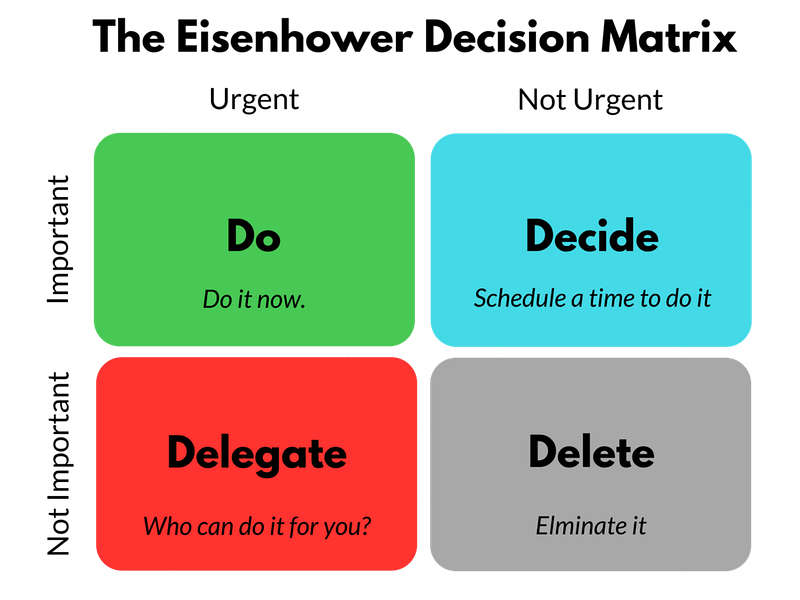How to Cut Or Delegate Tasks that Prevent You from Achieving Your Goals

Image by Philipp Stegmann from Pixabay
Avoid the mere-urgency effect to increase focus
What do you do when you’re faced with a lot of work and not much time to do it? If you’re like me, you first make a list and then frantically run through them to check each item off as soon as possible.
While that sounds like an organized, efficient approach, it’s not really so. A recent study in the Journal of Consumer Research saw how people prioritize when given a mix of urgent and important tasks.
After running five experiments, the researchers observed a peculiar pattern — we give our attention to tasks that are more time-sensitive over the less urgent ones, even when the less urgent tasks offer greater rewards.
This came to be known as the “Mere-Urgency Effect.” The workings of this effect sound obvious but the implications are far worse than they seem.
Over time, repeatedly choosing the urgent over the important leads to dissatisfaction and unnecessary busyness, as the same researchers also found.
But don’t worry, this effect is not fixed — meaning, we can change it using a few tools. The participants in the above study were also able to shift their habits once they considered the consequences.
So let’s see how we too can change our habits.
How to Be the President of The United States
“I have two kinds of problems, the urgent and the important. The urgent are not important, and the important are never urgent.” — Eisenhower
Saying that Dwight D. Eisenhower — five-star general during World War II and 34th president of the United States — was productive, would be an understatement.
He served two terms as president during which he led the construction of the Interstate Highway System, created NASA, signed into law the first major piece of civil rights legislation since the end of the Civil War, ended the Korean War, welcomed Alaska and Hawaii into the union, and managed to keep the Cold War with Russia cold.
A big contributor to his success was the power of discriminating between urgent and important. Using these insights, Stephen Covey, author of “The Habits of Highly Effective People,” created the Eisenhower Matrix to tackle the “Mere-Urgency Effect.”
So apart from becoming the President of the United States, the Eisenhower Matrix will help you focus on high-impact work, make progress toward long-term goals, delegate and manage tasks better, and lead a calmer work life.

Source, royalty-free.
I’m sure you’ve seen this matrix many times. It’s simple and designed to make you not just productive, but effective. Even after knowing this technique for years, I’ve only recently been able to appreciate its importance.
It divides your task into 4 quadrants based on urgency and importance, which Steven Covey describes as follows:
Urgent matters are those that require immediate action. These are the visible issues that pop up and demand your attention NOW. Often, urgent matters come with clear consequences for not completing these tasks. Urgent tasks are unavoidable, but spending too much time putting out fires can produce a great deal of stress and could result in burnout.
Important matters, on the other hand, are those that contribute to long-term goals and life values. These items require planning and thoughtful action. When you focus on important matters you manage your time, energy, and attention rather than mindlessly expending these resources. What is important is subjective and depends on your own values and personal goals. No one else can define what is important for you.
Q1: Urgent and Important
The urgent and important tasks require quick action mostly due to deadlines or having to help others who are on a deadline. Some examples include a last-minute project given to you, a colleague calls for help on something that’s due in an hour, clients come with a pressing problem, etc.
This quadrant cannot be avoided but should be minimized if possible. Since these tasks require a crisis mode response, constant work on them leads to stress and burnout. Plus, this comes at the cost of your long-term goals.
Q2: Not Urgent But Important
These are tasks that help you move closer to your long-term goals. Like making a strategy for the next quarter, maintenance work, networking, learning new skills, etc.
While they don’t have a deadline or an end date as such, they still give you satisfaction and long-term effectiveness. Tasks in this quadrant are those that are focused on growth and new opportunities.
Instead of solving problems, you’re looking for growth and strategy. In fact, an effective strategy can reduce a lot of your Q1 problems that suck your time.
Q3: Urgent But Not Important
These are pretty much time-wasters that include emails, SMS, social media, interruptions during the day, unsolicited phone calls, unnecessary meetings, etc.
Because we often perceive such tasks to be urgent, we assume they’re also important. Thus we spend most of our time on them after which there’s little or no time left for other important goals.
These tasks can feel like a burden and give you a sense of losing control over your time. The best way to deal with them is to delegate as much as possible.
Getting your groceries delivered through apps, using automatic note-making software, auto-renewal on your bills and subscription, using systems and labels to manage emails, etc are some examples.
If this is not possible, try to do these tasks when your energy level is low. Also, be clear about not picking new Q3 tasks during the day.
Q4: Not Urgent and Not Important
These are one level below time-wasters like mindlessly scrolling through social media, web surfing, compulsively refreshing your inbox, watching movies alongside work.
While we all need time to relax, this should be within your control at all times. Try to avoid unsatisfying distractions like TV and replace them with things you really love like playing sports, meditating, walking, singing, etc.
People who pursue self-mastery hobbies are more motivated, energetic, and sharp. And it makes sense — you’d feel much better the next day at work after having played a new song on the guitar, than finishing a movie marathon.
“Who can define for us with accuracy the difference between the long and short term! Especially whenever our affairs seem to be in crisis, we are almost compelled to give our first attention to the urgent present rather than to the important future.”
— Dwight D. Eisenhower, 1961 address to the Century Association
Steven Covey calls Q2 the “Quadrant of Quality” because this is where you grow the most. This is also the quadrant associated with deep work and flow.
In my work life, I’ve found it very easy to get caught up in quadrants 1 and 3. Over a period of few weeks, this led to a point where I couldn’t think of new ways to improve my work and thus not achieve our goals as a team.
Only recently have I been mindful of the true difference between the urgent and the important so I actually work on things that move the needle.
I learned this the hard way. But you don’t have to.
When faced with a lot of tasks, use the Eisenhower Matrix to decide your next steps. Ruthlessly cut out or delegate tasks that prevent you from achieving your goals.
Don’t let the urgent present take you away from the important future or else there’ll be no future to look up to.